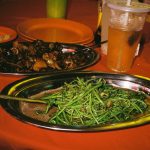Top Tips for Eating Healthy While Traveling: Expert Advice for Busy Travelers
Dealing with Travel-Induced Disruptions
Traveling can disrupt our usual routines, affecting everything from sleep patterns to digestion. To maintain health on the road, it’s important to address these disruptions effectively.
Combating Jet Lag and Fatigue
Jet lag and fatigue are common side effects of long-distance travel that can throw off our body’s internal clock. To mitigate these effects, we should try adjusting our sleep schedule to the new time zone a few days before departure. Staying hydrated and avoiding alcohol and caffeine can also help regulate energy levels. When we arrive, it’s helpful to spend time in natural light to help reset our circadian rhythm. Short naps can offer temporary relief, but it’s best to keep them under 30 minutes to avoid impacting nighttime sleep.
Prioritizing Sleep and Digestion
Prioritizing sleep while traveling is essential. Utilizing eye masks, earplugs, or white noise apps can create a conducive sleep environment. Staying consistent with our usual bedtime routines, like reading or meditating, can also be beneficial.
For digestion, incorporating fiber-rich foods such as fruits and vegetables into our diet is key. Drinking plenty of water aids in maintaining digestion, especially important when dealing with time zone changes. We should avoid heavy meals before bedtime to prevent indigestion and ensure a more restful sleep.
These steps can help us navigate the challenges of travel and maintain our well-being on the go.
Adapting to Local Environments
When traveling, embracing the local environment can be key to maintaining a healthy diet and well-being. Exploring local markets and adjusting to different cuisines offers a practical approach to making nutritious choices.
Exploring Local Markets
Local markets are treasure troves of fresh produce and regional specialties. Visiting these markets can give us access to fruits, vegetables, nuts, and other healthy foods. We can look for seasonal items that are often fresher and more nutritious.
Additionally, engaging with local vendors could provide insights into unfamiliar foods and how to prepare them. Trying regional products can introduce us to new flavors and ensure a varied diet. This not only supports our health but also enhances our vacation experience.
Adjusting to Different Cuisines
Every destination has its unique culinary traditions, which often include healthy options. When dining out, it’s helpful to opt for dishes that are grilled, steamed, or baked rather than fried. Selecting meals that feature lean proteins, whole grains, and plenty of vegetables is advisable.
We can also adjust by asking for dressings and sauces on the side to control portion sizes and reduce calorie intake. Understanding local dietary staples and how they differ from our usual meals allows us to make informed and balanced choices. Adjusting to local cuisines doesn’t mean compromising on health; instead, it broadens our palate while keeping well-being in focus.



